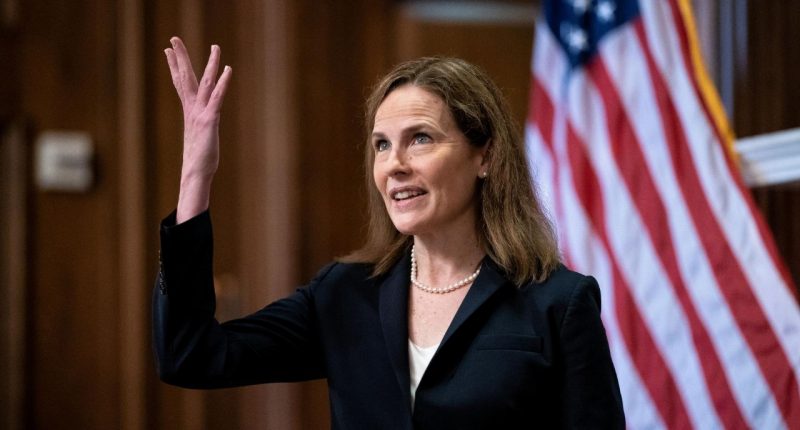- The United States Senate has confirmed Trump nominee Amy Coney Barrett to the Supreme Court today
- Today’s vote comes just a week out from the U.S. presidential election and bolsters the Supreme Court’s conservative majority six-to-three
- Judge Barrett’s nomination by President Trump drew harsh criticism from Democrat leaders, who argued the nomination should only have happened after Election Day
- Nothing in the U.S. constitution stops the U.S. president from nominating a court replacement in an election year, so Trump jumped on the opportunity
- Judge Barrett is generally favoured among social conservatives due to her historical stance on issues like abortion and gay marriage
- She will take her official constitutional and judicial oaths later today, after which she will officially become an active member of the court
The United States Senate has confirmed Trump nominee Amy Coney Barrett to the Supreme Court today.
Judge Barrett replaces the late Ruth Bader Ginsburg on the Supreme Court and bolsters the conservative court majority six-to-three.
Today’s vote comes just a week out from Election Day and was passed in spite of staunch Democrat opposition.
Who is Amy Coney Barrett?
Judge Barrett, known colloquially as ACB, has served as a circuit judge on the U.S. Court of Appeals since 2017.
The 48-year-old former academic is an originalist, meaning she works to interpret the U.S. Constitution as it was written rather than assuming it moves with the times.
Born in Louisiana, Judge Barrett is a devout Catholic but insists her faith does not influence her legal opinions. Nevertheless, she is generally favoured by social conservatives due to her historical stances on issues like gay marriage and abortion.
Judge Barrett lives in Indiana and has seven children — two of which were adopted from Haiti.
Why is the confirmation controversial?
Essentially, it boils down to the fact that Judge Barrett’s nomination to the Supreme Court by President Trump and her subsequent confirmation has happened so soon before the U.S. presidential election.
Democrat leaders have argued that Ruth Bader Ginsburg’s replacement should only have been named after the results of the election to be sure the judge accurately reflects the will of the American people.
On top of this, Senate Republications blocked a Barack Obama nomination to the Supreme Court in 2016 on the basis that it was an election year — drawing accusations of hypocrisy and demands for consistency from the opposition.
Nevertheless, there is nothing in the Constitution blocking the United States President from nominating someone to the Supreme Court during an election year.
Moreover, there have been eight occasions in U.S. history when a Supreme Court nomination was made during an election year by a President from the same party as the Senate majority. Of these eight times, only one nomination was not confirmed, and that was based on personal corruption that was brought to light post-nomination.
On the other hand, only two of seven historical nominations during an election year were confirmed in a split government, meaning the Senate majority and the President are from different parties. This was the case with Obama’s nomination in 2016.
As such, much to the contrary of what Democrats are saying, Senate Majority leader Mitch McConnell claims the Amy Coney Barrett confirmation is following historical U.S. precedent.
Semantics aside, Judge Barrett has also copped criticism for her stance on the U.S. Affordable Care Act. Her open criticism of Obamacare has led to fears that she will push the court to overturn the Affordable Care Act and leave millions of Americans stranded without health insurance in the middle of a pandemic.
Health care is a basic human right, and we fight for basic human rights. Read my new piece on @byshondaland on why we all need to stop Trump’s Supreme Court nominee Amy Coney Barrett from overturning the Affordable Care Act. https://t.co/XKB7mcvvl3
— Elizabeth Warren (@SenWarren) October 19, 2020
Of course, Judge Barrett and the Supreme Court have never confirmed plans to strike down the entire affordable care act. As such, time will tell if Democrat fears will come to pass.
Judge Barrett is set to take her official constitutional and judicial oaths later today, after which she will become an active member of the court.







